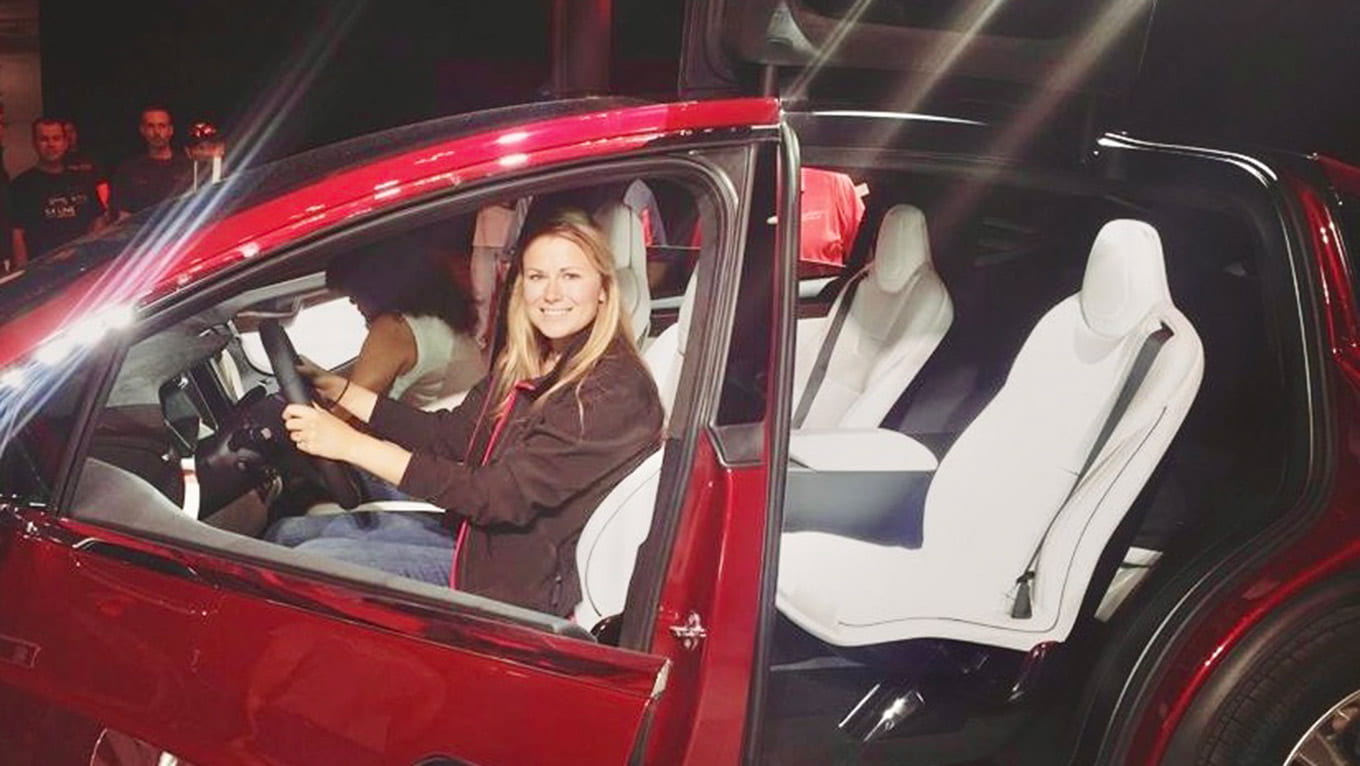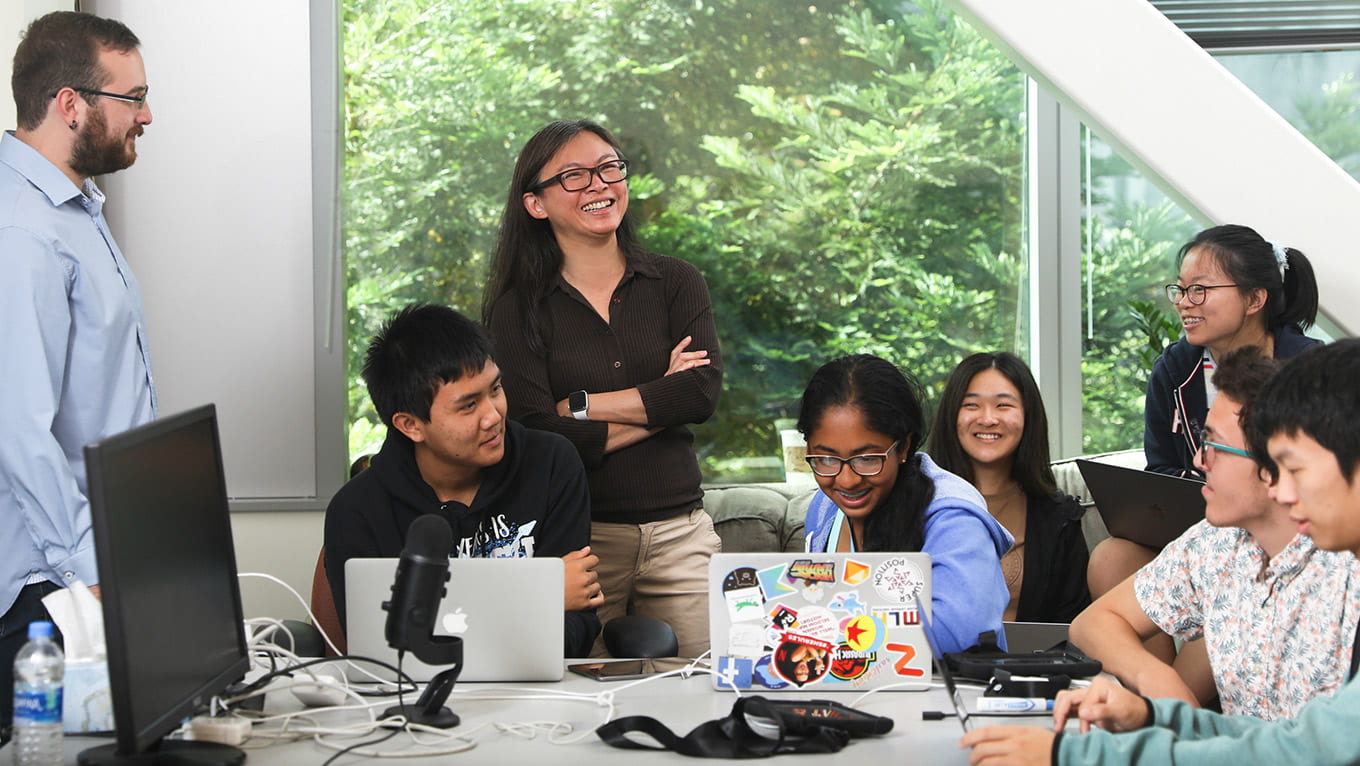Just six months after she graduated from the UC Santa Cruz Baskin School of Engineering with a B.S. in Electrical Engineering in 2014, Olivia Oswald landed a dream career at Tesla, a clean-energy company famous for its electric vehicles.
“I feel very lucky to be where I’m at,” Oswald says. “Tesla was always a dream company of mine.”
Landing a lucrative career right out of college takes a lot of hard work and networking, as Oswald herself will admit, and she says that taking proactive steps to prepare yourself for the job market while you’re still in school is crucial. Her biggest secret to success? Engaging in as many hands-on learning experiences as possible.
“In my presentation at Tesla I heavily leaned on my experience as an intern at Zero Motorcycles, and also my senior design project and the robot I made in the 118 [Mechatronics] class… and I think all three of those things were very relevant to the role,” Oswald says.
Oswald’s path to engineering
When Oswald first started college, engineering was not even on her radar. “I wasn’t really exposed to engineering much growing up, so I think that’s why it took me a while to consider it,” she explains.
Oswald began her academic career as a major in environmental science, which seemed like the most natural fit for her passion to help protect the planet. After taking a few courses, however, Oswald realized that what she really wanted was to take a more proactive role.
“The environmental science major was more about policy and litigation,” she says. “I wanted to be a part of a more tangible solution. That was the thought process that led me toward engineering.”
Mechatronics, motorcycles, and senior design
In her engineering courses, Oswald found that she was able to engage in more of the hands-on problem-solving that she craved. She says that one of her most memorable experiences at UCSC was the mechatronics course she took with Gabriel Elkaim. In the course, students are required to build a robot that will compete against other robots in the class, which Oswald describes as both a grueling and exciting experience.
“Getting the robot working in the time allotted was very challenging. There were a lot of nights where we slept in the lab and didn’t go home… but it really bonded that group of people, and I just remember having very close friendships with the people I went through that course with.”
Oswald also credits the mechatronics class with giving her the first real sense of what it would be like to be an engineer in the field.
“[Professor Elkaim] actually had industry experience, which was very valuable,” Oswald notes. “Some of the practical lessons he taught us helped prepare me for the real world. For example, he once said something to the effect of, ‘When you go out into the real world and you’re asked to work on a project, you’re going to have to justify why it’s worth the cost,’ and I have found that to be so true.”
During Oswald’s senior year, a professor with a connection to Zero, a company that makes electric motorcycles in Scotts Valley, turned her on to a year-long internship with the company. She loved working at Zero and the positive impact they were having on the environment, and it was there that she began to think that she would like to work in the transportation industry long-term. She decided to do a senior design project on motorcycle safety, and asked Zero to sponsor the project. Zero agreed to donate a motorcycle, which allowed Oswald and her team to get experience retrofitting an actual vehicle with different sensors, and they ultimately won second place at the end-of-the-year senior design poster session.
After graduating, Oswald decided that she didn’t want to stay in Santa Cruz long-term and moved to the Bay Area looking for opportunities. Tesla was not as much of a household name in 2013 as it is today, but she had been exposed to the company through her coworkers at Zero and had become a fan. When she saw that they had a job opening, she jumped at the chance. “I didn’t really feel super qualified because I had only been out of college for six months,” she admits, but her extensive experience on real projects through Mechatronics, Senior Design, and Zero got her the job.
Advice for job-seekers
Oswald’s biggest piece of advice for other students is to get as much hands-on experience as they can while they are still in school.
“Pursue as many internships as early as possible. That was a huge thing for me,” she says. “The first job is always the hardest because understandably companies need something to go on… and if you’re graduating with no real world experience it can be really hard to sell yourself and get a good job. My first internship was just working at a lab somewhere on campus- so you start small, you start unpaid, and then you just get whatever you can get and work from there.”
Oswald also advises students not to limit themselves when they are applying to jobs by automatically assuming they don’t have the right qualifications. Although she has a degree in electrical engineering, many of her jobs at Tesla have been more mechanical-based, and she has been able to learn much of what she needed on the job.
“I have seen people take the job description a bit too literally and don’t challenge themselves to go outside of the box. In my experience, as long as you can explain to the employer why you feel like you have the base knowledge to do the job and learn whatever you need to do to do it, most people are not locked into a specific degree. My career is a testament to that… I would have really limited my opportunities if I had just thought, oh, I can only apply to this job that is hiring electrical engineers.”




